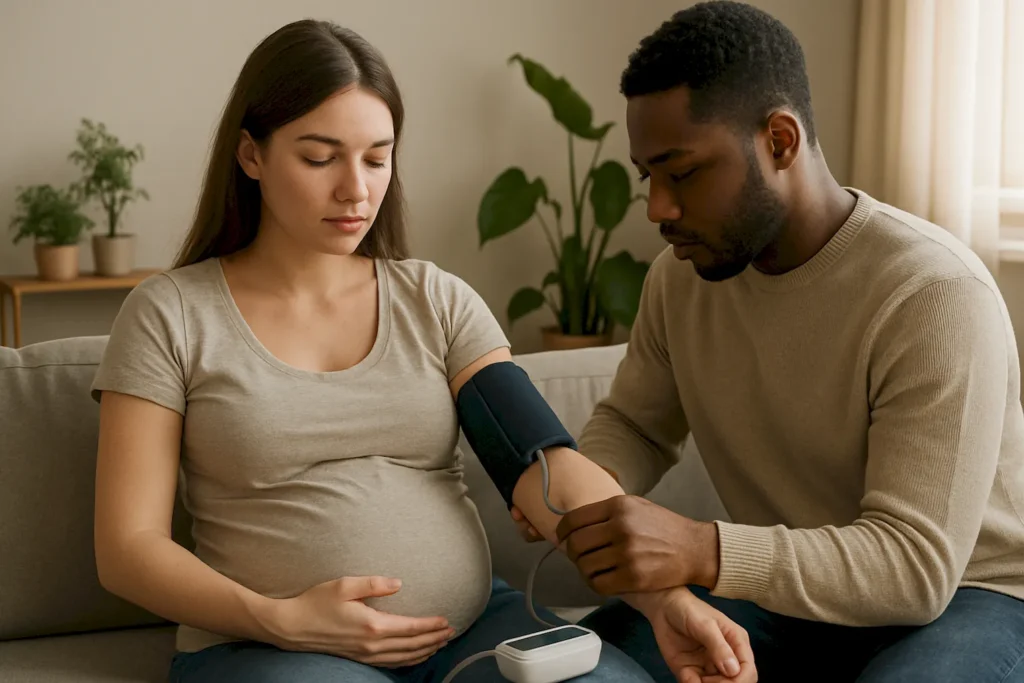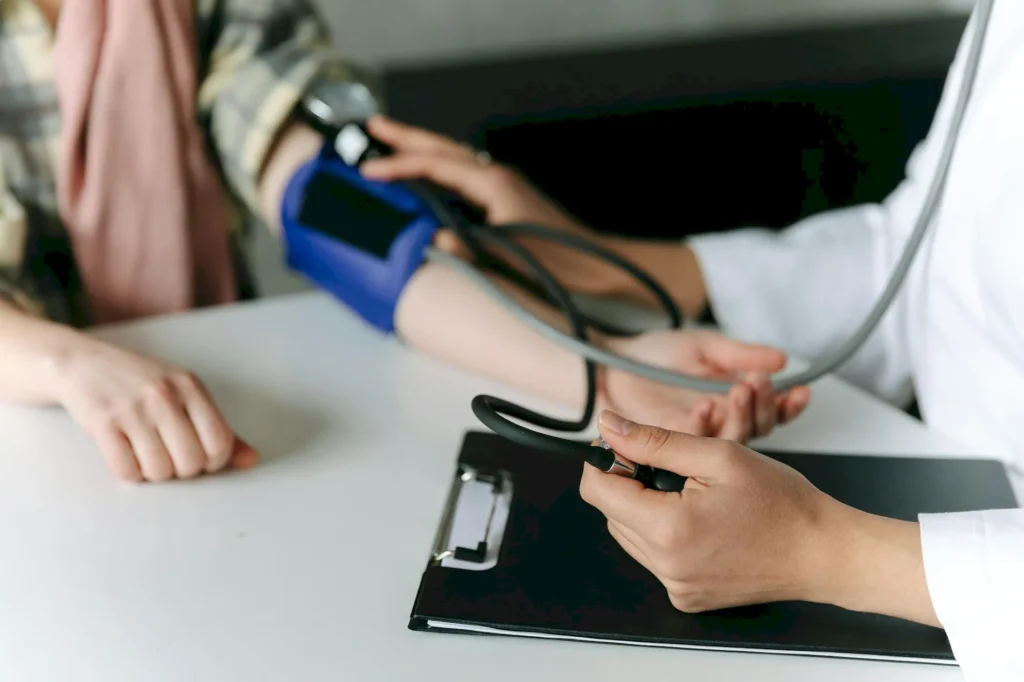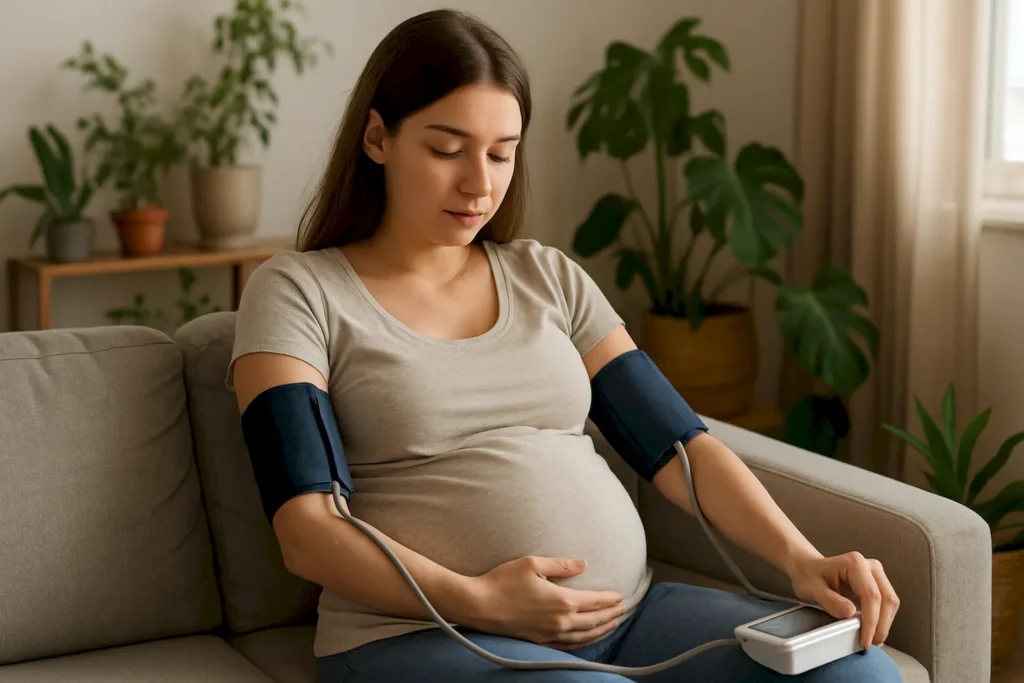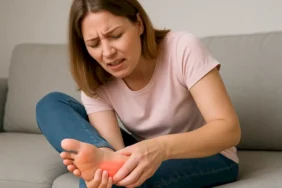High blood pressure after pregnancy is a serious yet often overlooked condition that can affect new mothers during the postpartum period. While many assume that pregnancy-related health concerns end with childbirth, elevated blood pressure can continue—or even begin—after delivery. Understanding the causes, warning signs, and treatment options is crucial for ensuring a safe and healthy recovery. In this article, we’ll explore everything you need to know about postpartum hypertension and how to protect your well-being during this important stage of motherhood.
What Is High Blood Pressure After Pregnancy?
High blood pressure after pregnancy, also known as postpartum hypertension, can be a concerning health issue for new mothers. It is essential to understand that while some women may experience elevated blood pressure during pregnancy, this condition can also manifest after childbirth. High blood pressure after pregnancy can be caused by various factors, including hormonal changes, stress, and pre-existing health conditions that may have been exacerbated during pregnancy. Recognizing and addressing this condition is crucial for the overall health and well-being of the new mother.
Key Aspects of High Blood Pressure After Pregnancy
- Timing: High blood pressure can occur shortly after giving birth or may develop weeks or even months later.
- Symptoms: Common symptoms can include headaches, visual changes, and swelling in the hands and feet.
- Diagnosis: Regular blood pressure monitoring is vital to identify postpartum hypertension.
- Risk Factors: Women with a history of gestational hypertension or preeclampsia are at a higher risk.
- Treatment: Management may involve lifestyle changes, medication, or close monitoring by healthcare professionals.
- Health Implications: Untreated high blood pressure can lead to serious complications for both the mother and the baby.
Understanding the signs and implications of high blood pressure after pregnancy underscores the importance of seeking medical advice. The risk of complications, such as cardiovascular diseases, increases when postpartum hypertension is not adequately treated. It is beneficial for new mothers to be aware of their blood pressure levels during the postpartum period to ensure they receive necessary care in a timely manner.
Understanding Postpartum Hypertension
Postpartum hypertension represents a significant health concern and emphasizes the necessity for vigilant monitoring after childbirth. This condition can manifest even in women who had normal blood pressure throughout their pregnancy. The management of postpartum hypertension often involves lifestyle adjustments and may necessitate pharmacological intervention if blood pressure levels remain elevated. Additionally, establishing a supportive environment is vital, as stress and lack of sleep can influence blood pressure readings.
Common Causes of High Blood Pressure After Pregnancy
High blood pressure after pregnancy, also known as postpartum hypertension, can be a concerning issue for new moms. Understanding the postpartum causes of this condition is crucial for timely management and intervention. Several factors may contribute to elevated blood pressure levels following the birth of a child. These causes can vary widely, but recognizing them can help in effectively altering lifestyle choices and engaging with healthcare professionals.
Hormonal changes following delivery can significantly influence blood pressure. During pregnancy, a woman’s body undergoes a variety of physiological changes that play a role in blood pressure regulation. After childbirth, fluctuations in hormones like estrogen and progesterone may lead to instability in blood pressure levels. Additionally, fluid retention that may occur post-delivery can also contribute to the issue. It is essential for new mothers to monitor their blood pressure closely during this period.
Common Causes of High Blood Pressure After Pregnancy
| Cause | Description | Impact on Blood Pressure |
|---|---|---|
| Hormonal Changes | Fluctuations in hormones like estrogen and progesterone. | Can contribute to hypertension instability. |
| Fluid Retention | Accumulation of fluids post-delivery. | May raise blood pressure levels. |
| Preexisting Conditions | History of hypertension or pre-eclampsia. | Increases risk for continued hypertension. |
| Stress and Fatigue | Physical and emotional stress of new motherhood. | Can elevate blood pressure levels. |
In addition to hormonal and physical changes, certain lifestyle factors can also exacerbate the risk of high blood pressure. Engaging in unhealthy eating habits, lack of physical activity, and inadequate sleep can contribute significantly to this condition. Therefore, it is vital for new mothers to make conscious choices regarding diet and exercise. Recognizing risk factors for hypertension during this period can greatly enhance the understanding and prevention of potential complications.
Factors Contributing to High Blood Pressure
- Previous history of high blood pressure
- Obesity or excessive weight gain during pregnancy
- Insufficient physical activity
- High sodium intake
- Emotional stress and anxiety
- Smoking or alcohol consumption
Physical and Psychological Factors
Beyond dietary and lifestyle choices, both physical and psychological factors influence high blood pressure after pregnancy. Physical stressors like recovery from childbirth, sleep deprivation, and the demands of caring for a newborn can lead to increased blood pressure. On the psychological front, emotional factors such as anxiety and postpartum depression are also common during this transition period. Managing these elements through support systems and professional health resources can significantly improve overall health and mitigate high blood pressure.
In addition to high blood pressure, some new mothers may experience heel pain after pregnancy, which can affect mobility and overall comfort during recovery. Changes in weight distribution, hormonal shifts that loosen ligaments, and increased physical strain can all contribute to this common but often overlooked postpartum problem. If you are experiencing persistent heel pain, it is important to discuss it with your healthcare provider to find appropriate treatment options and ensure it does not interfere with your healing process.
Signs and Symptoms to Watch For
As a new mom, it’s crucial to be vigilant about your health, particularly in the postpartum period. High blood pressure after pregnancy can manifest with a variety of symptoms, some of which may be subtle and easily overlooked. Recognizing the symptoms of postpartum hypertension early can help you seek timely medical attention, improving outcomes for both you and your baby. It’s essential to understand that not everyone will experience all symptoms, and the severity can vary from one individual to another.
Symptoms of High Blood Pressure After Pregnancy
- Severe headaches that are persistent
- Visual disturbances, such as blurred vision or seeing spots
- Shortness of breath or difficulty breathing
- Swelling in the hands and feet
- Nausea or vomiting
- High blood pressure readings taken at home or during check-ups
- Chest pain or discomfort
It is vital to be aware of these high blood pressure symptoms, some of which can indicate a more serious condition known as postpartum preeclampsia. If you experience any of these signs, don’t hesitate to consult your healthcare provider. Your health is paramount for your well-being and your baby’s development. By staying alert and informed, you can take proactive steps toward maintaining a healthy recovery after pregnancy.

Who Is at Risk for High Blood Pressure After Pregnancy?
Understanding who is at risk for postpartum hypertension is crucial for new moms as they navigate the challenges of motherhood. High blood pressure after pregnancy can affect a variety of women, depending on several factors such as pre-existing health conditions, lifestyle, and demographic characteristics. Awareness of these risks allows for proactive measures and timely management. It is essential to have regular check-ups and maintain healthy habits to mitigate the risks associated with high blood pressure.
Identified Risk Factors
- Previous History: Women with a prior history of high blood pressure are at a higher risk.
- Obesity: Excess body weight significantly increases the likelihood of postpartum hypertension.
- Gestational Hypertension: Those who experienced high blood pressure during pregnancy are more susceptible.
- Age: Older mothers, especially those over 35, may face higher risks.
- Family History: A genetic predisposition to hypertension can elevate risk levels.
- Diabetes: Women with diabetes or gestational diabetes are also at risk.
- Multiple Pregnancies: Carrying twins or multiples can increase the potential for high blood pressure.
High blood pressure demographics reflect a diverse population but signal the importance of monitoring this condition in new mothers. Statistically, certain groups, such as those with lower socioeconomic status or limited access to healthcare, may see heightened risks. Moreover, cultural attitudes toward health can impact a mother’s response to symptoms and her willingness to seek assistance. Recognizing these factors and understanding the collective experiences of different demographics can enhance support systems for women post-pregnancy.
Possible Complications If Left Untreated
If high blood pressure after pregnancy, also known as postpartum hypertension, is not properly managed, it can lead to several severe complications, affecting both the mother’s and the baby’s health. One of the primary concerns includes the risk of developing chronic hypertension, which can persist even after the pregnancy period. Additionally, untreated postpartum hypertension can increase the likelihood of cardiovascular diseases later in life, making it crucial for new moms to monitor their blood pressure regularly.
| Complication | Description | Long-term Impact |
|---|---|---|
| Stroke | A sudden interruption of blood supply to the brain. | Possible permanent disability or death. |
| Heart Disease | Increased risk of heart attack or heart failure. | Long-lasting heart health issues. |
| Kidney Damage | Potential impairment in kidney function. | Chronic kidney disease. |
| Eclampsia | A severe complication characterized by seizures. | Severe injury or death to mother and baby. |
Understanding the complications of postpartum hypertension is essential for new mothers. The risks extend beyond the immediate postpartum period and can have enduring effects if left unaddressed. Moreover, health risks after pregnancy can also lead to a decrease in the overall quality of life for mothers. These implications underscore the importance of recognizing and treating high blood pressure promptly.
Health Risks Associated with Untreated High Blood Pressure
- Increased risk of stroke
- Higher likelihood of developing heart disease
- Potential kidney impairment
- Risk of developing gestational diabetes in future pregnancies
- Long-term hypertension even after childbirth
- Possibility of eclampsia
It is vital for new mothers to seek medical advice if they experience signs of high blood pressure after pregnancy. Monitoring changes in their condition and being aware of any symptoms can greatly reduce the risk of complications. Regular check-ups provide the opportunity to catch potential health risks early on, ultimately contributing to better long-term health outcomes for both mothers and their children.

How Long Does High Blood Pressure Last After Giving Birth?
Understanding the duration of high blood pressure after pregnancy can be crucial for new moms as they navigate the postpartum period. While some women may experience a return to normal blood pressure levels within a few days after giving birth, others may find themselves facing elevated readings for weeks or even months. Factors such as pre-existing conditions, the presence of preeclampsia during pregnancy, and individual health profiles play significant roles in determining how long this condition persists.
Temporal Dynamics of Postpartum Hypertension
Research indicates that hypertension after delivery can manifest in several ways, influenced by both biological and environmental factors. For many, high blood pressure after pregnancy may not resolve immediately, especially if there were complications during pregnancy. Typically, a significant subset of women may continue to monitor mildly elevated blood pressure for up to six weeks postpartum, resolving naturally as their body adjusts to the non-pregnant state. However, it’s important to monitor any symptoms that may arise during this time.
Duration and Management Steps
To assist new mothers in managing this condition effectively, understanding the steps to take in monitoring and addressing high blood pressure can be helpful.
- Schedule Regular Check-ups: Ensure you have follow-up appointments with your healthcare provider.
- Monitor Blood Pressure: Regularly check your blood pressure at home if recommended.
- Stay Hydrated: Drink plenty of fluids, which can help manage blood volume and pressure.
- Maintain a Balanced Diet: Incorporate potassium and magnesium-rich foods in your meals.
- Engage in Light Exercise: Gentle activities such as walking can help improve circulation and blood pressure.
- Reduce Stress: Practice relaxation techniques like deep breathing or meditation.
- Consult About Medication: Discuss any necessary medication with your healthcare provider if lifestyle changes are inadequate.
Managing high blood pressure after pregnancy requires vigilance and proactivity. By understanding the expected duration and following recommended management steps, new mothers can significantly improve their recovery and overall health outcomes.

Treatment Options for Postpartum High Blood Pressure
When managing high blood pressure after pregnancy, it is crucial to consider a variety of treatment options for high blood pressure that are safe and effective for new mothers. Addressing this condition early can significantly improve both maternal and infant health outcomes. Treatment approaches typically span both pharmaceutical and non-pharmaceutical methods, depending on the severity of the hypertension and any underlying health factors. Regular monitoring and consultations with healthcare professionals are essential for optimal care.
| Treatment Type | Description | Considerations |
|---|---|---|
| Medication | Prescription drugs prescribed for hypertension. | Consult a physician for proper dosage. |
| Dietary Changes | Incorporating heart-healthy foods and reducing sodium intake. | Consult a nutritionist for meal plans. |
| Exercise | Engaging in moderate physical activity, such as walking. | Ensure approval from a healthcare provider. |
| Stress Management | Practicing relaxation techniques like yoga and meditation. | Consider group classes or guided sessions. |
Among the various postpartum hypertension therapies, physicians often recommend a combination approach that addresses both medication and lifestyle modifications. This dual focus allows for a better management plan that caters to the unique needs of postpartum mothers. Regular follow-up appointments with a healthcare provider are essential to adjust treatments as needed and to monitor blood pressure levels closely.
Available Treatment Methods
- Antihypertensive medications (e.g., beta-blockers, diuretics)
- Dietary changes emphasizing fruits, vegetables, and whole grains
- Regular moderate exercise tailored for postpartum recovery
- Stress reduction techniques, including mindfulness and breathing exercises
- Frequent blood pressure monitoring at home
- Hydration management and limiting caffeine intake
- Seeking support groups for emotional health
Pharmaceutical and Non-Pharmaceutical Approaches
Pharmaceutical interventions often include medications that are deemed safe for breastfeeding mothers. These can effectively lower blood pressure and prevent potential complications. It is essential to openly discuss any concerns about medication side effects with healthcare providers, as there are various options available that may be tailored to individual health profiles.
On the other hand, non-pharmaceutical approaches play a significant role in overall recovery from high blood pressure after pregnancy. These methods focus on holistic wellness and lifestyle adjustments to support cardiovascular health. A comprehensive approach might involve nutritional counseling and incorporating more physical activity into daily routines. Both medicinal and lifestyle strategies contribute to managing high blood pressure effectively in postpartum women.
Home Remedies and Lifestyle Changes That Can Help
Managing high blood pressure after pregnancy is essential for new moms to ensure their well-being and the safety of their baby. Implementing effective home remedies for postpartum high blood pressure can significantly improve your health. Alongside medical advice, certain lifestyle changes for hypertension can create lasting effects that support recovery and long-term health.
Simple Lifestyle Adjustments
- Maintain a balanced diet rich in fruits, vegetables, and whole grains.
- Limit salt intake to reduce water retention and lower blood pressure.
- Stay hydrated, aiming for at least 8 glasses of water daily.
- Avoid excessive caffeine and alcohol, which can elevate blood pressure.
- Monitor your weight and strive to maintain a healthy body mass index (BMI).
- Establish a regular sleep routine to promote recovery.
- Incorporate relaxation techniques, such as meditation or deep breathing exercises.
By integrating these tips into your daily routine, you can better manage your condition and foster a healthier lifestyle. Dietary recommendations play a crucial role in controlling blood pressure. Consuming potassium-rich foods like bananas, avocados, and leafy greens can help counteract sodium’s effects, effectively lowering blood pressure levels. Additionally, paying close attention to portion sizes can assist in maintaining a healthy weight post-pregnancy.
Exercise and Relaxation Techniques
Regular physical activity is another vital component in addressing high blood pressure after pregnancy. Even moderate exercises, such as walking or gentle yoga, can prove beneficial in reducing stress and improving overall cardiovascular health. Engaging in activities that promote relaxation—like guided meditation or yoga—can help combat anxiety, which may exacerbate hypertension.

High Blood Pressure After Pregnancy: When to See a Doctor
Understanding when to consult a doctor for high blood pressure is essential, especially for new moms who may not be familiar with the implications of elevated blood pressure after pregnancy. If you experience any concerning symptoms or have persistent high blood pressure readings, it is crucial to seek medical advice. Many new mothers might be unsure if their symptoms are related to postpartum recovery or if they signal a more serious condition. Being proactive can help avoid potential complications and ensure your health and well-being.
Guidelines for Seeking Medical Help
- Monitor your blood pressure regularly, especially if you have a history of hypertension.
- Seek immediate medical attention if you experience severe headaches or visual disturbances.
- If you notice sudden swelling in your hands or face, consult your doctor promptly.
- Contact your healthcare provider if symptoms of shortness of breath or chest pain occur.
- Make an appointment if you are feeling unusually fatigued or have persistent dizziness.
- Follow up after delivery to discuss any lingering symptoms with your doctor.
Recognizing the signs and deciding when to consult a doctor for high blood pressure can significantly affect your postpartum recovery. Remember, it’s better to err on the side of caution. Don’t hesitate to reach out to your healthcare provider if you have any concerns about your health. Taking proactive measures today can lead to a healthier tomorrow for both you and your baby.






